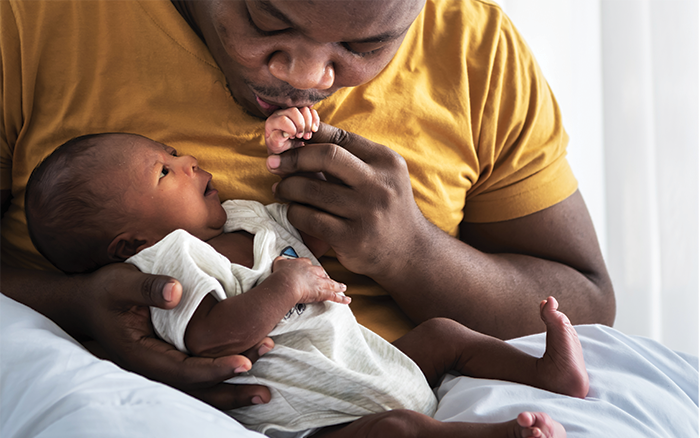
Guide to Maternal & New Parent Mental Health
The journey to parenthood is an exciting experience filled with joy, love, and growth. It can also be a time of stress, anxiety, and emotional upheaval. The changes that come with pregnancy, childbirth, and caring for a newborn can take a toll on anyone’s mental health.
“Parenthood also brings upheaval,” writes a mom on a NAMI Blog post about her experience with postpartum depression. “Daily routines become irrelevant, sleep is sporadic and scarce, and guilt can take over in ways it never did before. Our old, familiar lives vanish. Like our babies, we’re born into new way of life, and it can take a while to adjust and adapt.”
Mental health includes our emotional, psychological, and social well-being. It affects how we think, feel, and act, as well as how we relate to others, handle stress, and make healthy choices —and is important at every stage of life. Maternal mental health, also known as the perinatal period, refers specifically to the psychological well-being during pregnancy and up to 18-24 months after giving birth.
The statistics around maternal and new parent mental health conditions are eye-opening:
- Each year, 500,000 pregnant women in the U.S. will experience a mental health condition either before or during pregnancy.
- As many as 75% of pregnant individuals with mental health symptoms do not receive treatment.
- Adverse childhood experiences can increase risk for prenatal depression symptoms, especially in low-income women.
- 1 in 10 men experience postpartum depression.
It’s crucial to understand that maternal mental health concerns can affect all parents, regardless of gender identity, sexual orientation, or socioeconomic status. This guide is designed to provide support and resources for all expecting and new parents, including teens and young mothers, nonbinary and transgender birth givers, and non-birthing partners. In our guide, you’ll find:
- Practical strategies for managing mental health conditions like depression, anxiety, obsessive compulsive disorder (OCD), and bipolar disorder before, during, and after pregnancy.
- Insights into treatments available to treat mental health symptoms, including medications, throughout the perinatal period.
- Tips and resources to nurture your mental health, including self-care practices and building a strong support network.
Remember, you are not alone. Millions of parents navigate the emotional complexities of parenthood, and there are many resources available to support you through the challenges. “I understood intimately how some people might not even know that there is a path to recovery — that we just need the right help to get there,” shares another mom on a NAMI Blog post. We hope to provide you with information and guidance as you prioritize your mental health during this extraordinary time.
Need Immediate Help?
If you or someone you know is experiencing a mental health emergency and needs immediate assistance:
- Call or text 988 Suicide & Crisis Lifeline
- Call or text 1-833-852-6262 National Maternal Mental Health Hotline
- Call or text 1-800-944-4773 Postpartum International Support
- Call 911 or go to the nearest emergency room
Advocating for Perinatal Mental Health Care Equity
The availability of and access to quality and equitable perinatal care is critical for your mental health. However, underrepresented groups often face challenges getting their overall health care needs fully met, and this can compromise mental health. Learn more about getting the care you deserve on the Mental Health Before Pregnancy webpage.





